Also known as
Spiritual Healing - Holistic Health Care
Alternative Health Care - Holistic Medicine
>Alternative or Complementary Medicine
Non-Traditional Health Care
What does Holistic mean?
[Related Questions: What is the definition and meaning of Holistic? What is a "holistic" approach? What is meant by "Holistic Viewpoint"? What are some examples of holistic thinking? What is the difference between holistic thinking and partial thinking? What is the importance of a holistic perspective?]
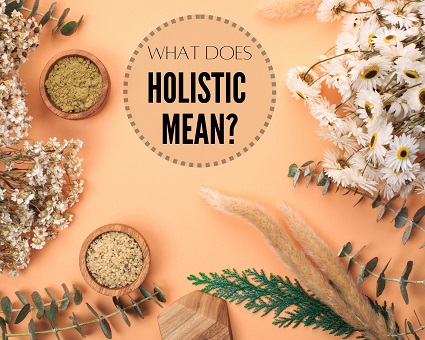 The term “Holistic” refers to consideration of the entirety (whole) of something and the factors that influence it rather than focusing on individual parts or issues. A Holistic approach looks at systems and dynamic interactions.
The term “Holistic” refers to consideration of the entirety (whole) of something and the factors that influence it rather than focusing on individual parts or issues. A Holistic approach looks at systems and dynamic interactions.
In the medical context, a holistic approach considers all aspects that affect the health of a living being, which may include mental, emotional, spiritual, kinetic, nutritional, social, and environmental aspects, among others.
How does Holistic differ from Conventional Health Care?
[Related Questions: Is holistic health a new form of medicine? How does holistic medicine work? What does holistic mean to you in holistic healing and natural healthcare? What's better, holistic healing or doctor’s medical advice? Why should I consider holistic medicines as an effective alternative? What are common principles or concepts of Holistic Treatment?]
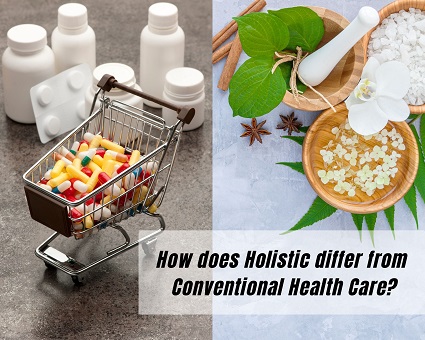 The holistic medical approach is to find deficiencies or imbalances in any aspect of a person’s life that are causing health dysfunctions and to provide non-intrusive, natural adjustments to restore health and vitality. The basic assumption, founded in Eastern cultural beliefs, is that our bodies are self-adjusting energy systems in the natural world and can overcome most ailments and heal themselves with proper attention and care.
The holistic medical approach is to find deficiencies or imbalances in any aspect of a person’s life that are causing health dysfunctions and to provide non-intrusive, natural adjustments to restore health and vitality. The basic assumption, founded in Eastern cultural beliefs, is that our bodies are self-adjusting energy systems in the natural world and can overcome most ailments and heal themselves with proper attention and care.
In contrast, conventional (allopathic) medicine in western culture has historically categorized medical issues into specialties by symptoms, conditions, or physical location. Data from scientific clinical studies are used to design drugs, surgery, or medical devices as treatments. These treatments modify bodily functions to reduce symptoms of illness or trauma. The underlying concept is that the body is a machine with parts or systems that may be repaired, adjusted, or replaced.
In recent years conventional health care practitioners have incorporated many holistic ideas and practices—calling them Preventive, Supplementary, Complimentary, or Alternative Health Care. Use of massage, Reiki, acupuncture, nutrition, yoga exercises, herbal remedies, and other practices have become accepted and more frequent as part of a conventional medical treatment program.
Is Holistic or Conventional Medicine better?
[Related Questions: What do you think about holistic health? Do you believe in holistic medicine? Which do you trust more: Holistic or Western Medicine? What is the reason why? What are the benefits of holistic thinking?]
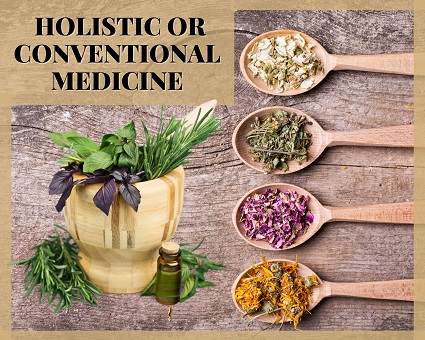 Eastern, holistic approaches for health care are generally considered best for creating and maintaining good health. They usually involve establishing ongoing physical, spiritual, and nutritional practices and adjusting as needed for long term or system ailments. Western approaches are generally considered best for injuries, urgent, or life-threatening conditions.
Eastern, holistic approaches for health care are generally considered best for creating and maintaining good health. They usually involve establishing ongoing physical, spiritual, and nutritional practices and adjusting as needed for long term or system ailments. Western approaches are generally considered best for injuries, urgent, or life-threatening conditions.
As an example, a conventional doctor could look at joint pain as a mechanical dysfunction and deal with it by surgical, drug, or rehab treatment. A holistic practitioner could recommend how body flexibility, strength, and vitality could be increased and how clearing spiritual energy blockages could reduce inflammation and the manifestation of pain. The holistic practitioner could also determine any spiritual, emotional, environmental, social, and financial issues that may be manifesting as physical problems. To a patient, the choice may depend on their belief system and what they are willing to do. Ultimately, the better choice is whatever works.
What are the Major Alternative Health Care systems?
[Related Questions: What are Alternative or Complimentary Medicines (CAMs)? Is holistic health a new form of medicine? What are some examples of holistic medicine? What are the types of holistic health? Types of Complementary and Alternative Medicine?]
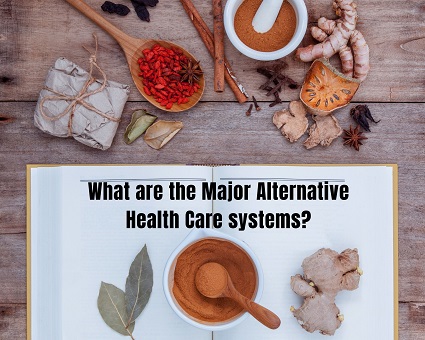 There are several major approaches to medical care that developed in different regions of the planet and now have global influence. As their theories and practices have been adopted for use along with conventional medicine, they have been labeled “Alternative” or “Complimentary” medicine.
There are several major approaches to medical care that developed in different regions of the planet and now have global influence. As their theories and practices have been adopted for use along with conventional medicine, they have been labeled “Alternative” or “Complimentary” medicine.
| Medical System | Description |
|---|---|
| Conventional/Western | Specialized diagnosis and treatment depending on condition, severity, and location of ailment. Symptoms of illness or trauma treated directly with drugs, surgery, or medical devices. |
| Traditional Chinese | Ailments are caused by an imbalance of Yin and Yang energy or a blockage of energy in the body. Treatment involves adjusting energy flow to restore balance and good health though exercise, massage, acupuncture, natural foods, and remedies. |
| Ayurveda (Indian) | The body, mind, and spirit are to be tended through exercise, meditation, and connections to the natural world. Health is maintained by keeping a balance three energy centers (doshas) that each manage a subset of your bodily functions. Disruptions can be corrected by cleansing, massage, adjusting the diet, and using ayurvedic medicines. |
| Kampo/Kanpo (Japanese) | Health is maintained by balanced energy flow, exercise, proper diet, and acupuncture. There are patented herbal remedies certified by the government of Japan. |
| Naturopathy (Europe) | The natural state of the body is health, and ailments are disruptions that are best corrected with natural herbal medicines, acupuncture, massages, and changes in diet. |
| Homeopathy (Germany) | Patients can be healed by taking small amounts of specific drugs that are formulated to generate similar symptoms of the troubling ailment. The body is able to overcome the negative influence of these small dosages proceed to recover from the original ailment. |
What types of Holistic Practitioners and Practices are available?
[Related Questions: What are the types of Holistic Health Care? What does it mean to be a holistic practitioner? Which is the most effective holistic healing technique based on energy? How is your experience with Holistic Health? What can you do as a holistic health practitioner? How does someone achieve holistic personal development? How can a community contribute to the holistic development of members? What is the best way to achieve holistic wellness? How can holistic health change life?]
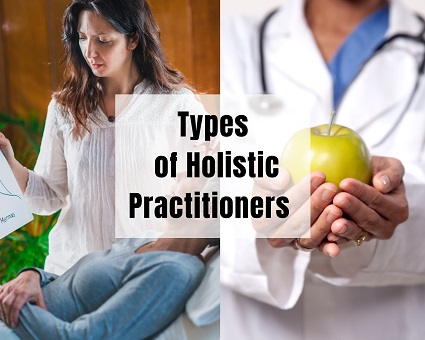 Spiritual and holistic practitioners and practices can positively influence your health outside of established health care systems. The chart below describes various Holistic Healing approaches, their uses and expected outcomes.
Spiritual and holistic practitioners and practices can positively influence your health outside of established health care systems. The chart below describes various Holistic Healing approaches, their uses and expected outcomes.
| Healing Method | Description |
|---|---|
| Acupuncture | A traditional Chinese method of removing blockages to the flow of life force energy (Qi or Chi) through the body by inserting fine needles at key energy centers (meridians). Acupuncture is primarily used to relieve pain or discomfort. The Mayo Clinic site cites the use of Acupuncture for various conditions such as “chemotherapy, dental pain, fibromyalgia, headaches, labor pain, Lower back or neck pain, osteoarthritis, menstrual cramps, respiratory disorders, and tennis elbow.” Others report relief from anxiety and depression. |
| Acupressure | Very much like acupuncture, but without the needles. The practitioner presses hands or elbows on energy centers in the body to clear blockages and facilitate energy flow of energy in the body. Acupressure is also used to relieve pain, discomfort, and stress-related conditions. |
| Aromatherapy | People have used the scents of various roots, leaves, and flowers scents to relax and enable healing for thousands of years. The knowledge of how to prepare these natural substances and release their powers through inhalation or skin applications has been transmitted through the generations. Aromatherapists can prepare custom oil formulas for specific customers and purposes. |
| Ayurvedic medicines | The formulas for some Ayurvedic medications can be found in venerable Indian documents that describe the plant and mineral substances known to heal various conditions and to help restore health and vitality. Medications may be combined with Ayurveda treatment may also include body cleansing or massages to remove toxins. These treatments are powerful and should be carefully monitored. |
| Biofeedback | Specific techniques have been proven effective for individuals to establish control of diverse bodily processes. People have learned to modify their heart rate and blood pressure, reduce the impact of headaches and other type of pain, for example. Once taught the appropriate technique, they can usually apply it themselves. |
| Chiropractic Treatments | Chiropractic practitioners use their hands (or other devices) to manipulate spinal vertebra and joints to adjust alignment. These adjustments release pressure on nerves, loosen muscles, and support healing for affected tissues, organs, and bodily processes. |
| Crystals | Crystals have healing properties in that they respond to specific vibration frequencies and can draw negative energy from the body. Some are aligned with the body’s Chakra energy centers and amplify spiritual vibrations or focus attention for meditation. Each type of crystal has a distinct color, composition, and vibrational effect. |
| Energy Healing | The scope of Energy Healing is as broad as Holistic Healing since it includes any method that involves life force energy. Reiki healing and Sound Therapies engage body energy directly. Holistic Nutrition and Mindfulness have more indirect but substantial influence on life force energy. Spiritual practitioners such as Psychics, Aura readers, Empaths, and Medical Intuitives often are highly sensitive to an individual’s energy field and can identify and help address a disruption, especially those with an emotional or spiritual basis. |
| Herbal Remedies | Every human culture has identified the healing properties of plant and minerals in their regions, and the most effective have become standardized remedies. Practitioners with herbal expertise can create custom remedies for specific conditions. |
| Hypnosis | Hypnosis can be particularly effective in reducing the effects of trauma, anxiety, and detrimental behaviors. It is best to be guided by a professional since the process may involve uncovering deeply distressing events and feelings. The negative energy associations are then diminished and released. Positive imagery and feelings are instilled to replace previous reactions to triggering circumstances. |
| Massage Therapy | In addition to feeling pleasant and comforting, the physical effect is to relax your muscles, help heal soft tissue injuries, reduce muscle contractions/spasms, release pressure on painful nerves and joints, and stimulate blood flow to internal organs. Beneficial effects include energy balance and spiritual calm. |
| Medical Intuition | A Medical Intuitive or Psychic is able to perceive energy readings from inside the human body and identify areas that may need unblocking, alignment, or treatment. Intuitives can also determine the spiritual or emotional issues that created the medical condition and assisting the patient in resolving them. |
| Meditation | The types and benefits of meditation are detailed on a separate FMP page. The spiritual peace of mind that comes with regular meditation carries over to general physical well-being, especially if it is used in combination with Yoga. |
| Mindfulness | Being Here Now, being present in the moment, being attentive to simple actions, and being aware of the natural world is a proven way to release stress and achieve a sense well-being. See the FMP page on Mindfulness for more examples. |
| Nutrition (Holistic) | Food is medicine. What you eat determines your health, temperament, energy level and balance. Holistic Nutrition considers not only calories and nutrients but removal of toxins and the healing properties of various foods for various conditions. |
| Reflexology | Massaging your feet stimulates the special neural connections between distinct parts of your feet and particular internal organs and bodily systems. Thus, stimulation balances body energy, reduces tension, aches, and anxiety. Massage of the hands and ears can have similar effects. |
| Reiki | As detailed on the FMP Reiki (Healing Hands) page, Reiki practitioners guide their hands over parts of your body, feel your life force energy and help to heal areas of negative energy and imbalance. |
| Self-Care Aids, Charms, & Objects | As detailed on the FMP Self-Care page, Self-Care means deliberately choosing activities that create the life experience you intend. Spiritual and Holistic Practitioners and retail venues offer an extensive range of items to support Self-Care that may include body products, herbal remedies, posters of affirmations, singing bowls for meditation, crystals, Tarot cards, amulets, sacred objects for personal alters, etc. |
| Sound Healing | As detailed on the FMP Sound Healing page, Sound Healing uses specific sound vibrations to create resonance for a physical and spiritual effect. Sound vibrational energy may be simple, such as repeating an OM mantra during meditation, or be profound, such as an immersive sound bath of pulsing chakra tones and gongs (OMG!). Sound healing is often used along with Reiki. |